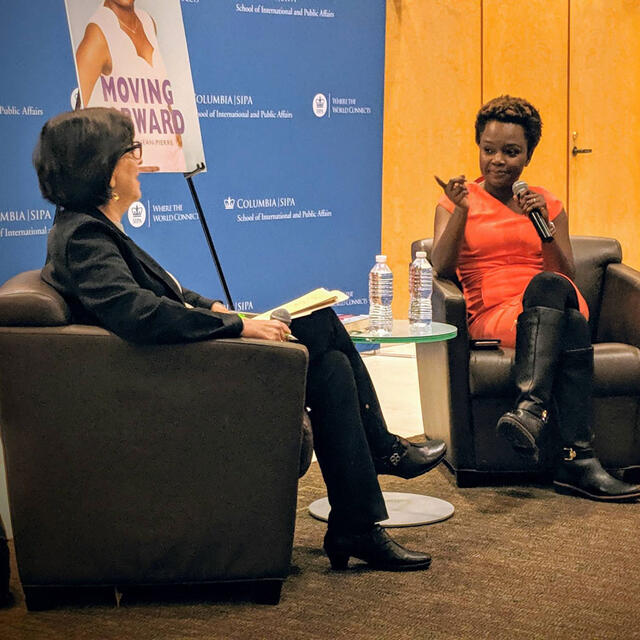
Looking Back and Moving Ahead: A Conversation with Karine Jean-Pierre

Sometimes you need to pull the energy together to overcome yet another obstacle you face.
Sometimes it’s easier to look at how much you’ve overcome already in order to completely push forward and overcome some more.
For SIPA professor and alumna Karine Jean-Pierre MPA ’03, overcoming obstacles and reminding herself of how far she’s risen is a daily occurrence.
At an event sponsored by SIPA’s Urban and Social Policy concentration and the student-run Civic and Voter Engagement Coalition, Jean-Pierre joined USP director Ester Fuchs to talk about her new book Moving Forward: A Story of Hope, Hard Work, and the Promise of America. A memoir in part, the book covers Jean-Pierre’s highly accomplished life so far—and the personal story that Jean-Pierre has kept quiet about until now.
Born in Martinque, Jean-Pierre emigrated to the United States from Haiti at age 5 and landed in Queens Village as the eldest child of two working-class immigrants.
“Growing up in an immigrant household, it’s very specific. My parents told me I could be a doctor, a lawyer, or an engineer,” she said, “And doctor was really what they were pushing for.”
Before Jean-Pierre discussed her background at greater length, she paused to note that Fuchs and David Dinkins — the SIPA professor and former New York City mayor who was in attendance — were two of the reasons why she got involved in politics.
“It matters to have mentors, it matters to have people who care about you, and they were not just invested in me while I was at SIPA, they were invested in me after SIPA.”
Jean-Pierre, who would go on to work in the White House under President Obama, talked about graduating from SIPA and later teaching a class there, becoming a political analyst for MSNBC and now moving on to become the senior advisor and national spokesperson to Move On.
She shared details of her personal life, citing a suicide attempt and also learning how to take care of her younger siblings while also coping with the expectations her parents had put forth on her.
“I wanted to tell a story that was honest, authentic and raw, and I think what happens is sometimes people see me either when I’m teaching or on TV and think ‘oh wow, she must have had this amazing life, she worked in the White House,’” she said. “And I really wanted to share parts of me that people didn’t know and parts of me that I hope connected with people who are having a hard time and couldn’t understand how to get to the other side.”
“I tell an immigrant story and I tell that immigrant story not just through my eyes but through the eyes of my mom and through the eyes of my dad.”
As the night turned more intimate as Jean-Pierre detailed the intricate stories that made her who she is today, she also took the time to talk about the current political climate and urge everyone to get involved in any manner.
“I’m afraid for my daughter,” Jean-Pierre started. She added everyone has so much to overcome, and she said as a black queer woman, she has to remind herself all the more that she overcame.
“I’m afraid for the people who look like me. I’m afraid for so many communities that would through this space, for what will happen if we wait.”
But still, Jean-Pierre mentions, there is a chance for the future if people get involved—and don’t wait.
“I’ve very lucky to be in a place where I go out to different cities, different states, and I talk to people all the time, and they give me hope,” she said, echoing sentiments of stories she’s heard and people becoming more politically engaged. “We have this kind of wonderful moment of being part of a fight together, and that energizes me because I’m lucky to be in that space.”
As Jean-Pierre stressed the importance of becoming politically active, be it by canvassing or volunteering, to losing your fears and starting to run, she stresses the importance of not doing it alone.
“There’s a community, and it’s really important to have a community to make sure you’re taking care of yourself physically, emotionally and mentally, because the fight is real. And it’s hard.”
“But thankfully,” she said concluding, “we’re fighting for everybody, and we can take all it on.”
— Catherina Gioino MPA ’20